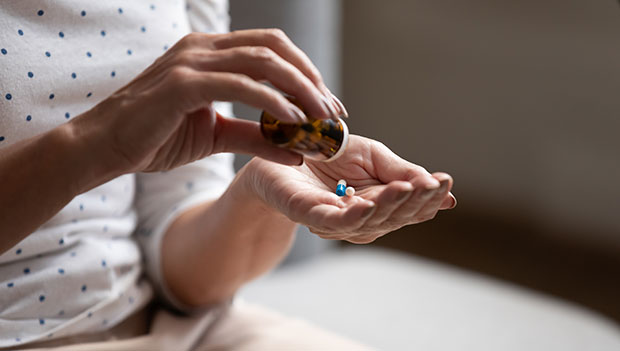
You've probably heard your doctor talk about "good" and "bad" cholesterol. LDL cholesterol is the "bad" cholesterol and ideally should be kept below 100 mg/dL. HDL is the "good" cholesterol and should be kept at 60 mg/dL or higher. Cholesterol levels that are too high can increase your risk of heart disease. High cholesterol that is left untreated can lead to something called atherosclerosis which is a build-up of fatty substances inside the blood vessels.
If you have cholesterol levels that aren't ideal (higher bad cholesterol and lower good cholesterol), you may want to consider trying a natural supplement. For example, fish oil helps get your cholesterol levels back where they should be. Before trying a prescription medication, you may be able to lower your cholesterol levels by adjusting your diet and incorporating a natural supplement into your daily routine. Below we're sharing some of the best cholesterol supplements.
Note: Always follow your doctor's guidance when treating high cholesterol.
Why Trust Us?
The health and safety of ACTIVE's readers is of the utmost importance to us. To ensure your well-being when consuming dietary supplements, the ACTIVE.com editorial team prioritizes products that are independently tested by a third party. We've consulted with a team of nutritionists and dieticians to ensure the products we feature are of the highest standard. This helps us create the most accurate, authentic review content for our readers.
The Best Cholesterol Supplements - Our Top Picks
By clicking on the product links in this article, we may receive a commission fee at no cost to you, the reader. Sponsorships and affiliate commissions help support our research so we can help you find the best products. Read the full affiliate disclosure here.
- Niacin
- Soluble Fiber
- Plant Sterols and Stanols
- Artichoke Leaf
- Omega-3
- Garlic
- Tea Tree Oil
- Green Tea Extract
Niacin
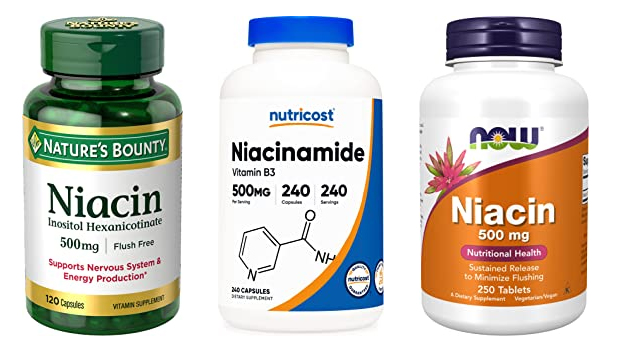
SPECS
- Benefits: Can raise good cholesterol and lower bad cholesterol
Niacin is a form of vitamin B commonly used to lower cholesterol levels. You can get a niacin prescription through your doctor or purchase it over the counter. Although niacin can be purchased over the counter, it is only recommended to use the prescription form of it to treat high cholesterol.
According to The Mayo Clinic, niacin can lower triglycerides by 25 percent and raise HDL (the good cholesterol) by 30 percent. Remember, the "good" cholesterol is the one you want to keep higher. You may experience some side effects from niacin, such as nausea, indigestion, gas, hot flashes, and skin flushing.
What We Like
- Available over-the-counter or in prescription form
- Proven to lower bad cholesterol levels and raise good cholesterol
- Niacin can also benefit the nervous system and keep skin and hair healthy
What We Don't Like
- May cause side effects
- May be unsafe to take with other cholesterol medications called statins
BUY: Niacin
Soluble Fiber
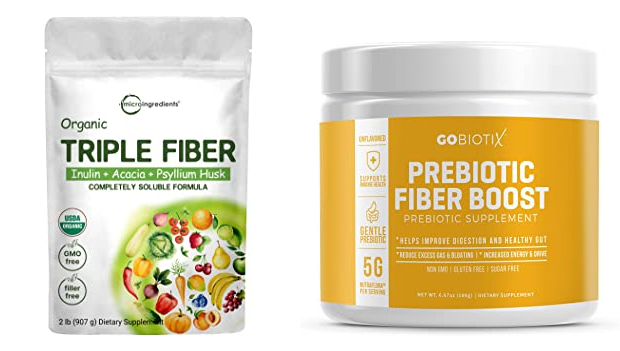
SPECS
- Benefits: Lowering bad cholesterol
Soluble fiber can lower LDL cholesterol levels by causing the intestines to absorb less cholesterol from food. When ingested, soluble fiber essentially acts like a sponge that soaks up different toxins (such as bad cholesterol) from the food you eat.
You can take soluble fiber as an over-the-counter supplement, such as psyllium powder, acacia fiber, and flaxseeds. Certain foods contain soluble fiber, such as oats, legumes, apples, berries, carrots, and yams. The main side effect of consuming too much fiber is bloating and gas.
What We Like
- Choose to take soluble fiber as a supplement or get it from eating certain foods
- Safe and natural
- Mild potential side effects
What We Don't Like
- May cause bloating and gas
- Soluble fiber supplements come at a higher price point when compared with other supplements.
BUY: Soluble Fiber
Plant Sterols and Stanols
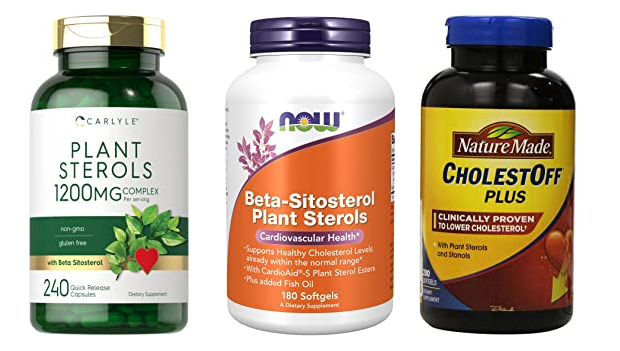
SPECS
- Benefits: Might reduce bad cholesterol levels
Plant sterols and stanols are a type of natural substance that is extracted from plants. When taken regularly, these plant extracts may help to lower LDL cholesterol levels.
A study found that plant sterols and stanols worked best to lower cholesterol when taken with a meal twice daily. Plant sterols and stanols are considered safe for most people. The most common potential side effect is diarrhea.
What We Like
- Generally safe for most people
- Naturally derived and plant-based
- Easy to purchase over the counter
What We Don't Like
- Higher price point than some other options
- May cause diarrhea
BUY: Plant Sterols and Stanols
Artichoke Leaf
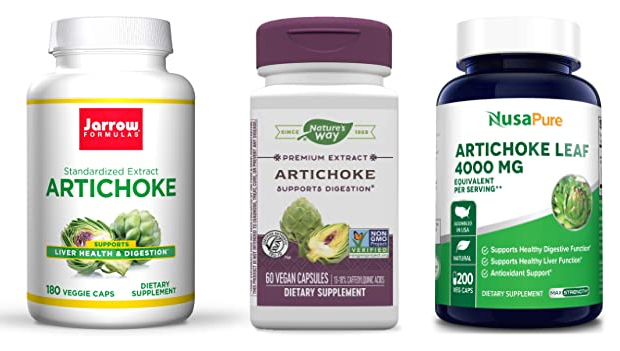
SPECS
- Benefits: Might lower bad cholesterol and raise good cholesterol
Artichoke leaf has been studied for its effects on cholesterol levels. This plant extract may help to lower bad cholesterol and raise good cholesterol.
Because artichokes contain a chemical called cynarin which helps to increase the production of and stimulate the flow of bile from the gallbladder, these processes help the body excrete excess cholesterol.
What We Like
- Easy to take in capsule form
- Natural and plant-based
- Many affordable options
What We Don't Like
- May cause some negative side effects such as bloating, gas, and diarrhea
- Some brands have magnesium stearate added, which isn't an ideal ingredient
BUY: Artichoke Leaf
Omega-3

SPECS
- Benefits: Improve triglyceride levels
Omega-3 supplements, such as fish oil, have been shown to improve triglyceride levels. Triglycerides are similar to cholesterol because they are another type of lipid in the body. High triglycerides sometimes occur in people who also have high cholesterol.
It isn't entirely clear how omega-3 supplements affect cholesterol levels. One study states that omega-3s lower triglyceride levels without affecting cholesterol levels. The Mayo Clinic says fish oil improves HDL or "good" cholesterol levels but may also increase LDL or "bad" cholesterol levels.
What We Like
- Offer a variety of health benefits
- Can lower triglyceride levels
- There are some affordable options
What We Don't Like
- How omega-3s affect cholesterol levels isn't entirely clear
- Fish oil supplements can leave a fishy aftertaste
BUY: Omega-3
Garlic

SPECS
- Benefits: May lower cholesterol levels
Garlic has various health benefits, including boosting the immune system and being anti-inflammatory. It may also help to lower cholesterol levels.
One study involved giving patients a combination of garlic and lemon juice and comparing their cholesterol levels to a control group. The results showed a significant decrease in cholesterol levels and blood pressure in individuals treated with garlic and lemon juice.
What We Like
- Natural and plant-based
- Offers many different health benefits
- Affordable
What We Don't Like
- Further research is needed to evaluate the long-term safety
- Some brands contain soy, so you should read the full ingredient label before purchasing
BUY: Garlic
Tea Tree Oil
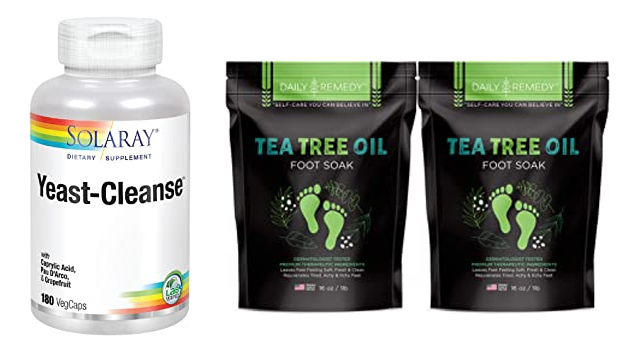
SPECS
- Benefits: Anti-inflammatory
Tea tree oil is an essential oil that has antibacterial properties. It is commonly used as a natural remedy for acne, dandruff, and athlete's foot.
The effects of tea tree oil on cholesterol levels aren't entirely clear. Tea tree oil for cholesterol needs to be studied further, but it can be taken or used topically for other purposes, such as anti-inflammatory properties.
What We Like
- Natural, plant-based oil
- Has anti-inflammatory properties
- Can be used topically to help with skin conditions like acne
What We Don't Like
- Effects on cholesterol are not entirely clear
- Some lower-cost options may be diluted with other oils
BUY: Tea Tree Oil
Green Tea Extract
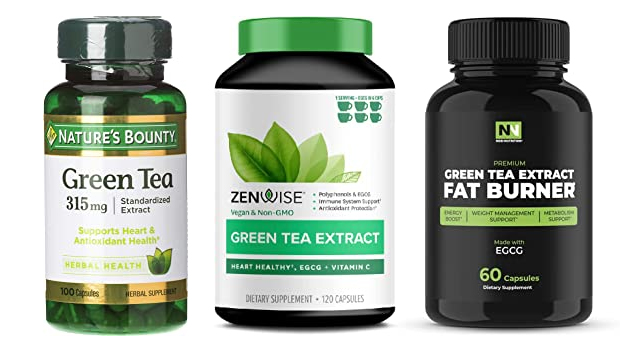
SPECS
- Benefits: May have a mild cholesterol-lowering effect
Green tea extract might help to lower cholesterol levels. One study found that green tea extract helped lower LDL cholesterol levels but didn't affect HDL cholesterol levels.
You can purchase green tea extract in a capsule, powder, or liquid form. Green tea extract does contain caffeine, so you'll want to moderate other forms of caffeine when taking it.
What We Like
- Many different forms (liquid, capsules, powder)
- Offers a variety of different health benefits
- Affordable options
What We Don't Like
- Cholesterol-lowering effects aren't entirely known
- Contains caffeine
BUY: Great Tea Extract
What to Look for in a Cholesterol Supplement
When shopping for a cholesterol supplement, you'll want to pay attention to the main ingredients and consider what types of benefits the supplements have to offer. Since every supplement will be a little different, it is important to research to figure out what to expect from certain supplements. Not everyone will benefit from the same supplements, so it is important to talk with your doctor about whether or not cholesterol supplements are good for you.
Who Should Take Cholesterol Supplements?
If you're looking for a supplement to help lower your cholesterol, you've probably recently discovered that you have high cholesterol. Cholesterol supplements can be an effective way to help bring down cholesterol levels in a natural way, however, every supplement comes with some risks. Just because a supplement comes from a plant doesn't mean it is completely risk-free.
Cholesterol supplements can interact with other medications and cause certain side effects. So you should always work with your doctor to determine what supplements you should take.
Benefits of Cholesterol Supplements
Cholesterol supplements can offer a natural method to lower cholesterol levels. If you find an effective cholesterol supplement that works well for you, it may be a way to naturally lower your cholesterol without taking prescription medications. Some cholesterol supplements, such as green tea extract, offer a variety of other health benefits, as well. You will likely be able to find cholesterol supplements that come at a relatively low cost and are easy to incorporate into your day-to-day routine.
Main Ingredients
Every supplement comes with its unique ingredient label. Typically a supplement will feature one main ingredient, such as garlic or artichoke leaf extract. Most supplements will have additional ingredients, so it is always good to look at the full ingredient label before purchasing anything. You'll want to look out for harmful additives that are bad for your health or that you might be sensitive to, such as gluten, GMOs, sugar, and dyes.
FAQs About Cholesterol Supplements
What is the fastest way to reduce high cholesterol?
Reducing your cholesterol will take time, no matter what approach you take. Making lifestyle adjustments can help, such as quitting smoking, improving your diet, and starting an exercise routine. The Mediterranean Diet is a heart-healthy diet recommended by the American Heart Association to help improve cholesterol levels.
Is walking good for high cholesterol?
Yes, walking is an effective method to help lower cholesterol. Exercise helps to stimulate the excretion of LDL cholesterol from the body, improving blood counts. A 30-minute walk three times per week can help to lower LDL levels and increase HDL levels.
Are cholesterol supplements worth it?
Cholesterol supplements can certainly help improve cholesterol levels in some situations. However, they are not for everyone. It is important to always work with your doctor when deciding what types of supplements and medications you should be taking. Some individuals will require prescription medications to improve cholesterol levels.
These statements have not been evaluated by the Food and Drug Administration. This product is not intended to diagnose, treat, cure, or prevent any disease.
About the Author

Sophia is a registered nurse and professional writer based out of Northeast Florida. She holds a bachelor’s degree in Nursing from the University of North Florida. Sophia is a long-distance runner who completed her first marathon in 2018. Today, she writes about various health-related topics and is committed to living a life of wellness and balance.






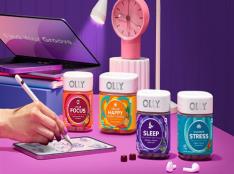
Discuss This Article